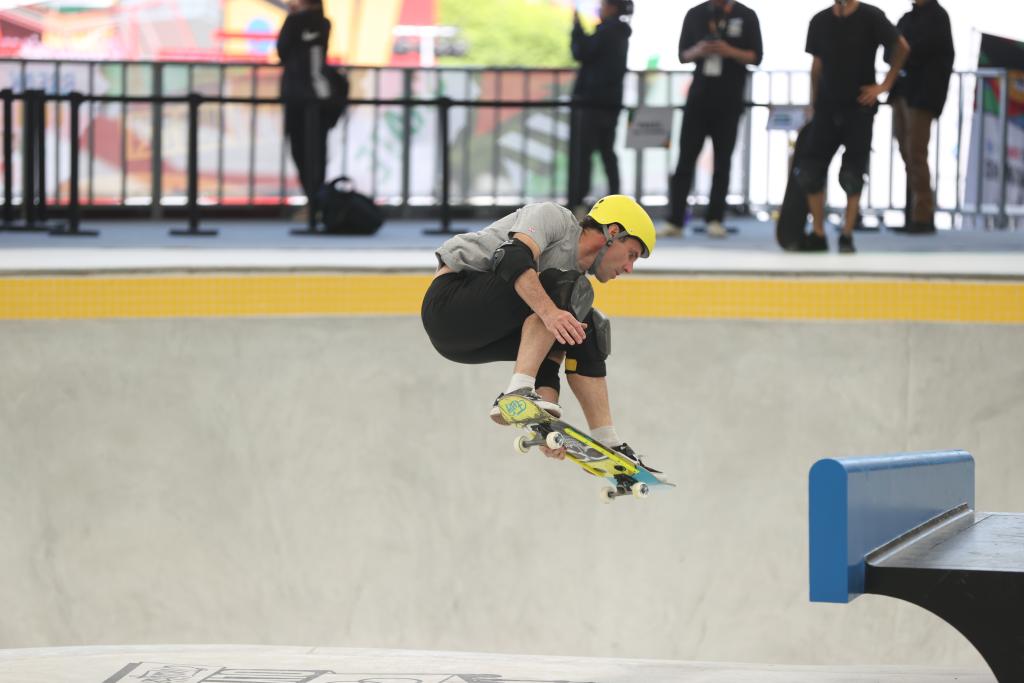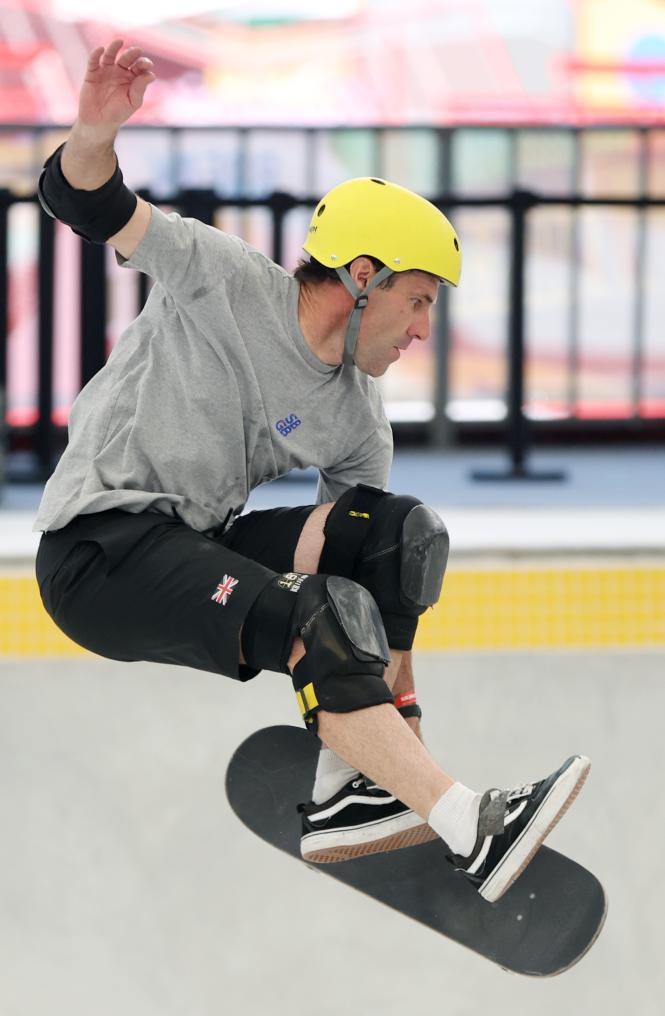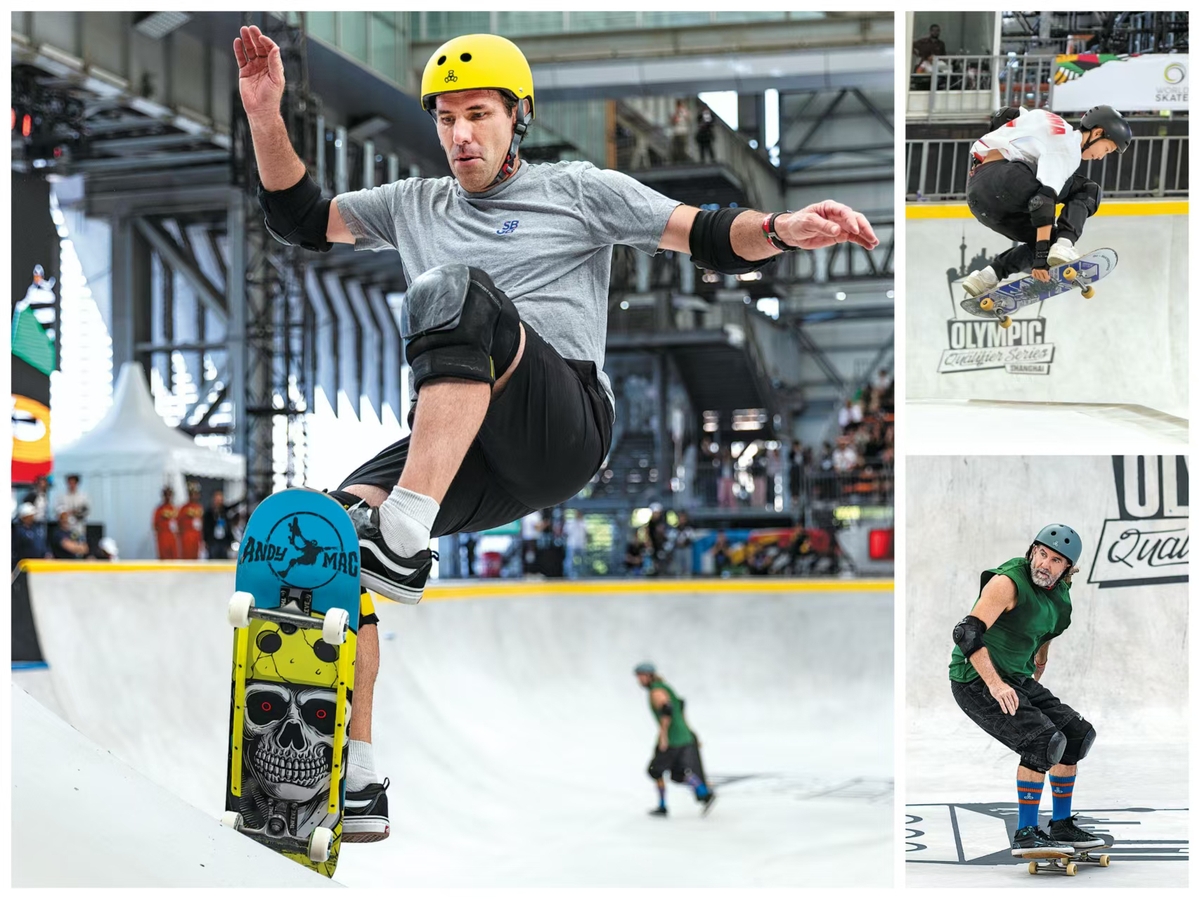
As China's 16-year-old skateboarder Chen Ye dropped in to get his final preliminary run going, a middle-aged man stopped at the edge of the hollowed-out concrete bowl, craned his neck and followed the teen's ride attentively.
Not a coach, nor a judge, the man wearing a yellow helmet turned out to be another competitor, who couldn't help but recall his own teenage years as a rider, more than three decades ago.
ALSO READ: 13-year-old girl Cui becomes China's youngest Asiad champ
Soon to turn 51 and still competing, Andy Macdonald of Britain was the oldest in the field across all four sports at last week's Olympic Qualifier Series first leg in Shanghai, and he took pride in still competing for an Olympic berth against such a sophisticated group of teenagers in a sport where the fearlessness of youth seems to rule.
Whether he makes it to Paris or not, the old dog is still as excited about learning new tricks as he was when his sport had nothing to do with the Olympics at all.
"This is what I've been doing since I was 12 years old. That's what drives me, to try and learn new tricks and see the progression of it. Age is just a number," Macdonald told China Daily, after finishing three preliminary runs in the men's park qualifiers at the Huangpu Riverside venue in Shanghai on Friday.
READ MORE: HK's skateboarding pioneer sees growth of sport on mainland
"It's what gets me up every day. You don't get old and quit skateboarding, you quit skateboarding and get old. I just never stopped.
"It's like keeping my mental health and my physical health. If I am competing or not, I'd still be doing it anyway," said the legend, who was born in Massachusetts in the United States, but chose to represent his father's native Britain for a less-competitive Olympic trial.
"I love traveling, meeting new people, experiencing new things and getting to see the world, and that doesn't get old. So, if I can do it riding my skateboard for free, why should I stop?" said Macdonald, who missed the sport's Olympic debut in Tokyo.

Whole new trick
Riding for fun, and for a paycheck at commercial events, as Macdonald has been doing for decades, may never get old for him, but preparing for a serious global competition, such as the Olympics, takes the challenge to the next level — as highlighted by the jaw-dropping tricks and growing technical standards shown by younger riders, in their skateboarding prime, at the Shanghai meet.
Macdonald, who's racked up 23 X-Games medals, mostly in that event, found the Olympic discipline of park skateboarding quite tricky, mostly due to the lower vertical drop-off at the edge of the bowl, as opposed to the much deeper descent of a pipe course, and the different judging criteria in execution, course use, flow and consistency
Known as a master in vert skateboarding, also known as half-pipe, Macdonald, who's racked up 23 X-Games medals, mostly in that event, found the Olympic discipline of park skateboarding quite tricky, mostly due to the lower vertical drop-off at the edge of the bowl, as opposed to the much deeper descent of a pipe course, and the different judging criteria in execution, course use, flow and consistency.
He enjoys the challenge, anyway, even now that he's feeling the pull of gravity a little more.
"I'm, like, trying to learn a new discipline," said Macdonald.
"I can do the tricks on a big 14-foot ramp when I'm seven feet in the air, and, now it's like 'can you do them on a nine-foot ramp when you're only two feet in the air?' Everything just happens a lot faster (riding a bowl), and I don't move as fast as I used to," he said.
To try and fail, but fail better, Macdonald, who finished the prelims 30th overall, is not there alone.
South Africa's Dallas Oberholzer, 48, and Rune Glifberg of Denmark, 49, were also in Shanghai attempting to secure a berth for Paris 2024 after both having competed at Tokyo 2020.
The trio of Gen X-ers, who defined skateboarding alongside the great Tony Hawk, all failed to make it to the semis in Shanghai, and will likely not get to ride in Paris due to not being placed high enough in the Olympic World Skateboarding Ranking.
Even with a final qualifying event to go, in Budapest from June 20-23, to make the top-20 cut on the ranking by the June 24 deadline seems a tall order.
As long as they feel fresh on the journey, it doesn't matter where it ends, said Oberholzer, who fell during all three prelim runs on Friday, but drew loud cheers from the Shanghai crowd every time he climbed up.
"I learned a new trick in this park yesterday," Oberholzer said. "That's what skating is all about — progressing — and that's what keeps me young and keeps me wanting to skateboard. There's no real sense of needing to give up if I'm still learning tricks."

Future on 'the right path'
With the next generation of riders now exposed to serious training earlier, and the sport promoted to a wider audience thanks to its Olympic inclusion, Macdonald believes skateboarding is riding down the right path.
And that's despite some die-hard dissenters voicing their opposition to the rigorous regime brought by the Olympics.
"I think that people were afraid that it would change the sport's mentality," said Macdonald, who personally welcomes the culture shift.
"Yes, the Olympics are going to make skateboarders take it more seriously and get coaches and trainers, whereas 20 years ago, when I was pro, you weren't allowed to say the word 'train'.
READ MORE: Skateboarding embraces roots as sport prepares for Olympic debut
"Then, slowly people started taking it seriously and realizing that 'if I want to get better, if I want to do well in competition, I need to train'.
"There are still skateboarders today who couldn't care less about the Olympics. They're just like 'oh, we're going to hop a fence and scale the backyard pool', to them, that's skateboarding, and you can never take that away. But, my opinion is that you can have both."
Riding on the Olympic momentum, the street sport's popularity is taking off in China, evidenced by the bustling scenes of toddlers trying mini ramps at the dockland park in Shanghai during the qualifier and looking up to teen star Chen, who won the Asian Games title last year at just 15 years old.
"It's so cool to see," said Macdonald. "Not only are kids getting into it, but internationally, because of the Olympics, there are more places where it's more accessible all over the world. There are more places for kids to get involved in these sports than ever before."



